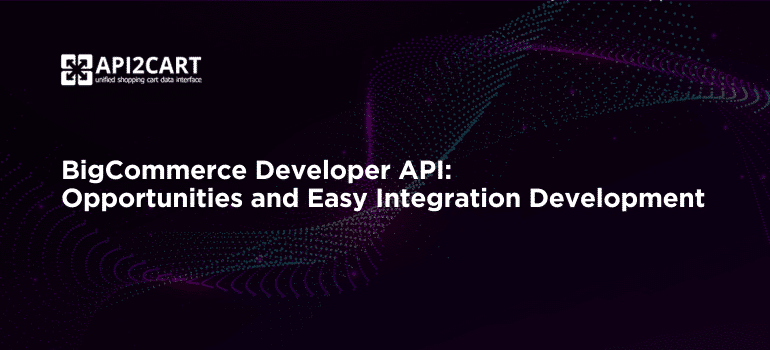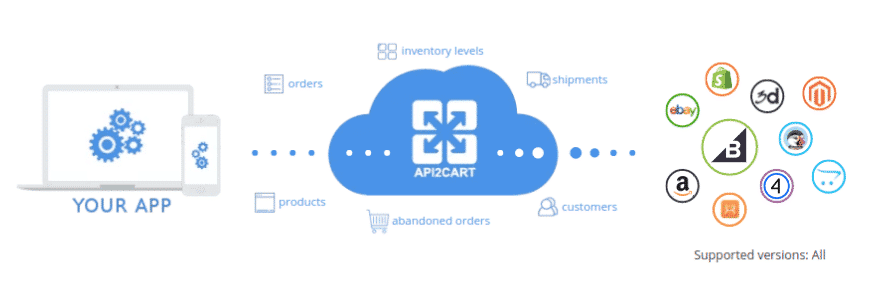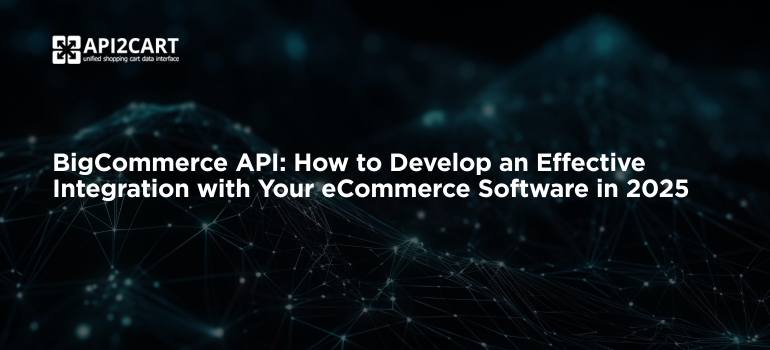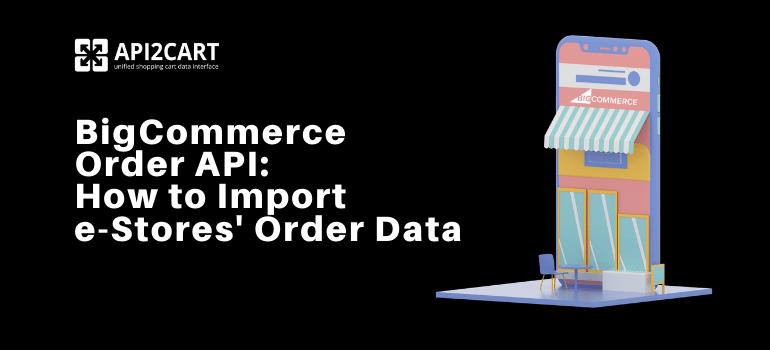
API2Cart is a universal API that simplifies integration with BigCommerce and other eCommerce platforms. You can import orders from BigCommerce easily and streamline your order management process, saving time and resources by providing a unified API, eliminating the need for individual platform integrations.
As eCommerce continues to grow, businesses are increasingly seeking ways to customize and enhance their online stores. BigCommerce, one of the leading eCommerce platforms, offers a powerful Developer API that enables software developers to build custom applications, integrate third-party services, and extend the functionality of BigCommerce stores. Whether you're creating custom storefront experiences, automating business processes, or developing apps for the BigCommerce App Marketplace, the Developer API provides the tools and flexibility you need.
This article serves as an introduction to the BigCommerce Developer API, outlining its key features, benefits, and how developers can leverage it to create innovative solutions. We'll explore the API's architecture, authentication methods, and common use cases, offering insights into how developers can seamlessly interact with BigCommerce's platform. By the end of this guide, you'll have a solid understanding of what the BigCommerce Developer API offers and how to get started with building your own applications.
What is BigCommerce Developer API
BigCommerce is a popular eCommerce platform that provides a powerful Developer API for software developers to create, integrate, and extend online store functionalities. It enables developers to build custom applications, automate store management, and connect BigCommerce with third-party services, such as ERP, CRM, payment gateways, and marketplaces.
The BigCommerce Developer API is a RESTful API that enables software developers to integrate, extend, and automate various aspects of BigCommerce stores. It provides programmatic access to essential eCommerce functionalities, such as product management, order processing, customer data, inventory control, and payments.
By leveraging the BigCommerce API Integration, developers can build:
- Custom eCommerce applications to enhance store functionality;
- Third-party integrations with ERP, CRM, and fulfillment systems;
- SaaS solutions that connect BigCommerce with other marketplaces and tools;
- Automation scripts to streamline store operations.
The BigCommerce Developer API is a powerful tool for software developers looking to build scalable and efficient eCommerce applications. Whether you're developing a custom integration, SaaS solution, or automation script, the API provides everything needed to manage and sync customers, products, orders, inventory, and payments programmatically.
Key Capabilities of the BigCommerce Developer API:
- Product Management – Create, delete and update products programmatically;
- Order Processing – Sync orders between BigCommerce and external fulfillment systems;
- Inventory & Pricing Control – Maintain accurate stock levels and automate price updates;
- Customer Data Management – Retrieve and manage customer profiles for personalized experiences;
- Payment & Transaction Handling – Integrate with custom payment gateways and process refunds.
BigCommerce API supports OAuth 2.0 authentication, ensuring secure data access. Additionally, developers can use webhooks for real-time event notifications, reducing the need for constant API polling.

Advantages of BigСommerce Developer API
The BigCommerce Developer API provides software developers with powerful tools to build, integrate, and automate eCommerce applications. Whether developing custom storefronts, third-party integrations, or SaaS solutions, this API offers flexibility, scalability, and efficiency for handling key eCommerce operations.
Here are the top advantages of using the BigCommerce Developer API:
1. RESTful and GraphQL API for Flexibility:
- BigCommerce offers both REST and GraphQL APIs, allowing developers to choose the best approach for their projects;
- REST API – Ideal for managing products, orders, customers, and store settings;
- GraphQL API – Enables developers to fetch only the data they need, reducing payload size and improving performance.
It provides developers with multiple options to optimize integrations based on performance needs.
2. Easy Authentication with OAuth 2.0:
- Uses OAuth 2.0 for secure access to store data;
- Allows developers to create integrations without exposing sensitive credentials.
It ensures security while enabling scalable third-party access.
3. Scalable & High-Performance API:
- Supports high API rate limits (up to 60,000 requests per hour) for enterprise-level applications;
- Efficiently manages large product catalogs, high-order volumes, and complex inventory systems.
It is suitable for small businesses and large-scale enterprises.
4. Headless Commerce Capabilities:
- BigCommerce API is headless-ready, allowing developers to build custom front-end experiences using frameworks, such as React, Vue.js, and Angular;
- Supports integration with CMS platforms.
Software developers can create flexible, personalized storefronts without backend limitations.
5. Extensive eCommerce Functionality:
- Product Management – Create, update, and delete products;
- Order Processing – Automate order fulfillment and status updates;
- Customer Management – Sync customer data with external CRM tools;
- Inventory Control – Ensure real-time stock updates;
- Payment & Checkout Customization – Build custom payment solutions.
Developers can automate and customize every aspect of an online store.
6. Webhooks for Real-Time Data Syncing:
- Supports event-driven architecture with webhooks for instant updates on product changes, order status updates, and inventory modifications;
- Reduces the need for continuous API polling.
It improves efficiency by enabling real-time automation.
7. Multi-Store & Marketplace Integration:
Supports integration with multiple storefronts and marketplaces like Amazon, eBay, and others;
Developers can create SaaS solutions that sync BigCommerce stores with various platforms.
It enables businesses to expand across multiple sales channels effortlessly. For example, see how API2Cart helps with BigCommerce Amazon Integration to connect stores directly with Amazon.
8. BigCommerce's Comprehensive Documentation & Developer Support:
- Well-documented API references.
- Sample code and SDKs for Python, PHP, Node.js, and Ruby.
- Developer forums and technical support.
It reduces development time and helps resolve technical issues quickly.

What is BigCommerce Integration?
BigCommerce integration for software developers refers to the process of connecting third-party applications, SaaS platforms, and custom solutions with BigCommerce stores using APIs and webhooks. This integration enables developers to automate eCommerce operations, sync data, and enhance store functionality by interacting with BigCommerce’s core features programmatically.
Why Do Software Developers Need BigCommerce Integration:
- Multi-Platform Connectivity – Enables seamless integration with ERPs, CRMs, payment gateways, and marketplaces (Amazon, eBay, Google Shopping, etc.);
- Automation of eCommerce Operations – Eliminates manual tasks by syncing products, inventory, orders, and customers between BigCommerce and external applications;
- Scalability & Performance – BigCommerce supports headless commerce, allowing developers to build custom front-end experiences using React, Vue.js, or Angular;
- Customization & Extensibility – Developers can create custom apps, plugins, and middleware solutions tailored to merchants’ specific needs.
For software developers, BigCommerce integration is essential for creating scalable, efficient, and automated eCommerce solutions. By leveraging BigCommerce’s APIs, GraphQL, and webhooks, developers can seamlessly sync data, automate workflows, and extend store functionality.
Easy Solution for Integration with BigCommerce Developer API
For software developers, SaaS providers, and eCommerce solution providers, integrating with BigCommerce is essential for enabling multi-channel selling, automated store management, and streamlined operations. However, developing a direct integration with the BigCommerce Developer API requires time, resources, and ongoing maintenance.
API2Cart provides an easy and scalable solution for integrating with BigCommerce and 60+ other eCommerce platforms and marketplaces, including Shopify, Magento, WooCommerce, OpenCart, Prestashop, through a unified API, eliminating the need for separate API connections for each platform.
Key Benefits of Using API2Cart for BigCommerce Integration:
- Single API for 60+ eCommerce platforms and marketplaces – No need to build separate integrations;
- Faster Development & Deployment – Save months of coding by using a pre-built solution;
- Automatic API Updates & Maintenance – No need to worry about BigCommerce API changes;
- Secure & Scalable Infrastructure – Enterprise-level security with high uptime;
- Webhooks for Real-Time Synchronization – Get instant updates on product, order, and inventory changes.

Steps to implement integration with BigCommerce using API2Cart:
Step 1: Sign Up for an API2Cart Account
- Go to API2Cart and create a developer account;
- After registration, you’ll receive API credentials, including an API key;
- Use these credentials to authenticate and start making API requests.
Step 2: Connect a BigCommerce Store
To integrate a BigCommerce store with API2Cart, you need the store URL and API credentials.
How to Connect BigCommerce to API2Cart:
- Log in to the API2Cart dashboard and go to "Add Store";
- Select BigCommerce from the list of supported platforms;
- Enter the BigCommerce store URL;
- Provide API credentials (OAuth token or API key) from the BigCommerce admin panel;
- Click "Connect", and API2Cart will establish a connection.
Once connected, API2Cart allows you to retrieve and manage store data using its API methods.
Step 3: Use API2Cart’s API Methods for BigCommerce
Now that you’re connected, you can start managing store data via API2Cart’s unified API:
- Retrieve a List of Products: product.list - Fetch all products from the BigCommerce store;
- Add a New Product to BigCommerce: product.add - Automate product imports and catalog synchronization;
- Retrieve Orders from BigCommerce: order.list - Sync BigCommerce orders with fulfillment systems;
- Update Orders in BigCommerce: Learn how to update orders and keep your system in sync with BigCommerce;
- Update Inventory Levels: product.stock.update - Prevent overselling by keeping stock levels updated.
Step 4: Set Up Webhooks for Real-Time Data Sync
API2Cart supports webhooks to notify your system when specific events occur in BigCommerce.
Supported Webhooks:
- New Order Placed – Triggers when a customer places an order;
- Stock Level Changed – Updates inventory automatically;
- Product Updated – Ensures accurate product data across platforms.
Use webhooks to sync orders, update inventory, and automate fulfillment without constant API polling.
Step 5: Test & Deploy Your Integration
- Use Postman, cURL, or API2Cart’s API Playground to test API calls;
- Validate responses to ensure accurate data retrieval and updates;
- Deploy the integration and monitor API logs for errors and rate limits.
For software developers, integrating with BigCommerce via API2Cart is the easiest and most scalable way to connect, manage, and automate store data. Instead of building a custom integration from scratch, API2Cart provides a unified API that saves development time, reduces maintenance efforts, and supports multiple eCommerce platforms.
If you have any additional questions, please schedule a FREE call with our experts.
Conclusion
In conclusion, the BigCommerce Developer API provides software developers with powerful tools to create customized eCommerce solutions. Its comprehensive suite of APIs, including the REST Management API, GraphQL Storefront API, Widgets API, and Webhooks, enables seamless integration of various store operations such as product management, order processing, and customer data handling. With the addition of the Payments API, developers can build personalized checkout experiences that enhance the overall shopping journey.
By leveraging BigCommerce’s APIs Integration, developers can automate key tasks, streamline operations, and deliver tailored shopping experiences to customers. The platform’s detailed documentation and flexible API architecture make it easier for developers to implement headless commerce solutions, third-party integrations, and custom storefronts.
As the eCommerce landscape continues to evolve, BigCommerce’s robust API ecosystem empowers developers to innovate and meet the ever-changing needs of online retailers. Whether building applications, automating processes, or enhancing user experiences, the BigCommerce Developer API offers the versatility and scalability required to drive eCommerce success.



